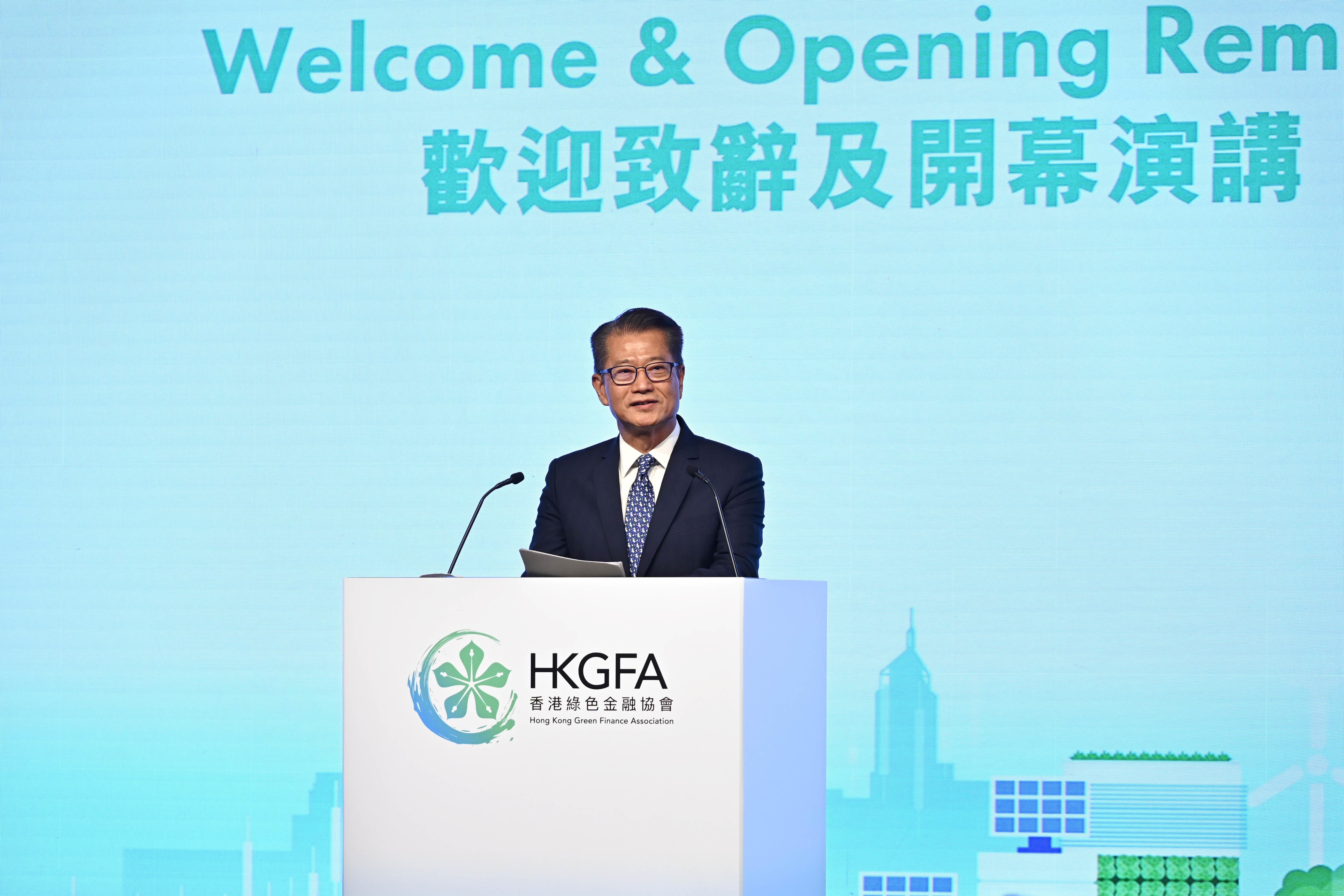 The Financial Secretary, Paul Chan Mo-po, speaks at the Hong Kong Green Finance Association Annual Forum 2023 on Oct 4, 2023. (PHOTO / HKSAR GOVERNMENT)
The Financial Secretary, Paul Chan Mo-po, speaks at the Hong Kong Green Finance Association Annual Forum 2023 on Oct 4, 2023. (PHOTO / HKSAR GOVERNMENT)
Government officials and experts painted a rosy picture of Hong Kong’s development as a regional green finance hub, citing the city’s advantages in having a sophisticated financial infrastructure, a sound capital market and a developing green framework system.
They made their remarks on Wednesday at the annual forum of the Hong Kong Green Finance Association, themed “Transition to Net Zero: from Ambition to Action”.
“Hong Kong is already Asia’s green finance hub,” Financial Secretary Paul Chan Mo-po said.
The total amount of green and sustainable debt arranged or issued in Hong Kong surpassed $80 billion last year, representing an over 40 percent growth year-on-year. The issuance of green bonds was equal to about one-third of the entire Asian market.
“This substantial volume demonstrates Hong Kong’s leading position as a pre-eminent platform and service provider in the region. Mainland entities and companies trust Hong Kong for green fund-raising. That also includes provincial and municipal authorities,” Chan noted.
He said Hong Kong welcomes the utilization of its financial services by countries from ASEAN (the Association of Southeast Asian Nations), the Middle East, and other economies engaged in the Belt and Road Initiative.
The finance chief also noted about 30 companies were introduced into Hong Kong by the Office for Attracting Strategic Enterprises. The signing ceremony for 20 new partnerships was held the same day.
The Hong Kong Monetary Authority at the end of June closed a market consultation on developing and adopting a green taxonomy in Hong Kong, categorizing economic activities based on their environmental friendliness or sustainability.
HKMA Chief Executive Eddie Yue Wai-man said the authority has received a positive response from the industry and major stakeholders in the energy, transport, building, waste and management sectors.
However, he said, there are numerous questions regarding implementation details, such as whether banks should be required to follow the common ground taxonomy, or if it should only apply to loans or bonds.
“We also need to address capacity-building arrangements to assist banks in utilizing the taxonomy effectively. Besides, we need to determine if any verification is necessary when adopting the taxonomy and how it will apply to existing products already held by banks,” Yue said.
“As an initial step, we propose using the taxonomy as a voluntary tool to develop the ecosystem. It can be applied to loans and green bonds. … Next, we will spend a few weeks organizing the responses and our internal considerations. Based on this, we will formulate recommendations and provide relevant guidance on using the taxonomy,” he added.
While green projects have gained attention, he highlighted the need for banks to “identify new ways to cooperate or assist projects in transitioning”.
The green transition from fossil fuels to clean power sources, such as solar and wind, means a delicate and decades-long switch requiring substantial investment.
The Hong Kong Special Administrative Region government is establishing public-private partnerships that facilitate the funds channeling required for transition projects, Yue told the over 1,500 forum attendees, who included regulators, representatives of financial institutions, entrepreneurs, and members of civil society from Hong Kong, the Chinese mainland and other regions, who participated in the annual forum either in person or remotely.
Julia Leung Fung-yee, CEO of the Securities and Futures Commission, noted that it is not solely a matter of appealing to bankers, private equities and financiers; the equity market is also a significant funding channel. “The companies themselves must actively articulate and implement transition planning.”
The Hong Kong Stock Exchange boasts a substantial share of listed companies engaged in electric vehicles, new energy, and renewable and solar power, which collectively contribute to a market capitalization of trillions of Hong Kong dollars.
Wong Chuen-fai, commissioner for Climate Change in the Environment and Ecology Bureau of the HKSAR government, said the bureau plans to establish a council on carbon neutrality and sustainable development. The council will advise the government on public strategies and actions for sectoral decarbonization, as well as engagement, publicity and educational needs, particularly focusing on young people.
Hong Kong has set a target of cutting its carbon emissions by half those of the 2005 level by 2035, and of achieving carbon neutrality by 2050.


